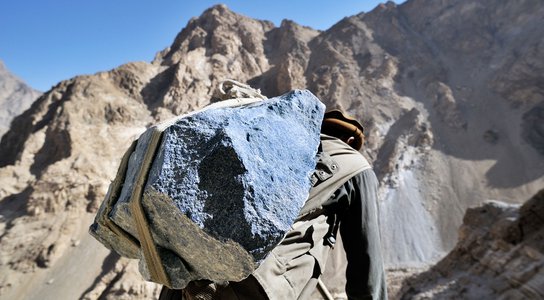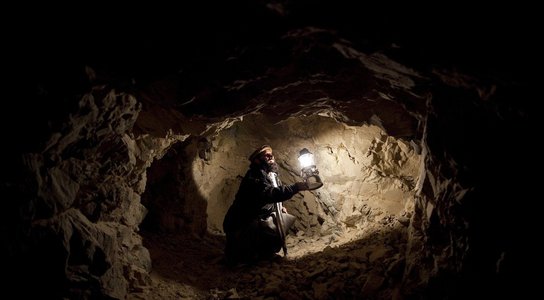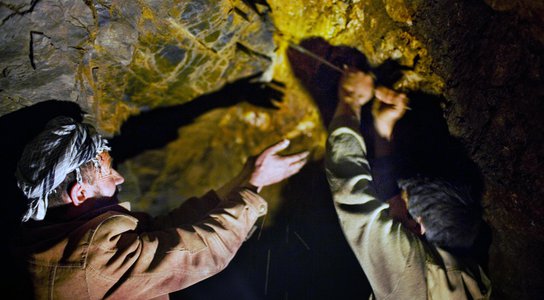Abuses and bad management around Afghanistan’s extractive industries (mining, oil and gas) are a threat to the stability and prosperity of the whole country – but they disproportionately harm the position of women.
This policy briefing explores these issues and puts forward detailed policy proposals. You can download the full briefing in the resources tab to the left.
Around the world, the extractive industries affect women in different ways than men. As the World Bank has reported, “Men have the most access to the benefits, which consist primarily of employment and income, while women and the families they care for are more vulnerable to the risks created by the extractive industries, which consist of mostly harmful social and environmental impacts.”
Afghan women were the ones who lost most from the war and militarization - Horia Mosadiq of Amnesty International
In Afghanistan the harm from the extractive industries has three key elements:
- Extractives
directly sustain conflict – arguably the greatest driver of harm for Afghan
women. They fund armed groups and political actors who undermine stability in
general and the position of women in particular, and who directly carry out
abuses against them.
- Abuses and
corruption around mining divert the revenues which might fund social
investments like education, infrastructure and health, which are
disproportionately important to the position of women, to the private pockets
of political actors and armed groups.
- Extractives create direct social and environmental impacts which
disproportionately affect women, such as water pollution, out-migration of men, and increased
criminality.
Increased transparency, accountability and community engagement not only offer a realistic prospect of reducing this danger, but can also, if done right, empower women and give them a greater voice in the use of these rich resources. Community monitoring of mining, and crucially provision for communities to have a fair share in the revenues they generate, are especially important in this respect.
Basic policy changes can substantial reduce abuses around extractives – and empower women
Corruption and conflict around extractives are a major challenge, but they are not intractable – and the right reforms can especially strengthen the voice of women. Empowering women in turn supports efforts to ensure the extractive sector benefits all of society. Global Witness and Integrity Watch Afghanistan, working in collaboration with other Afghan and international CSOs and a range of experts, have developed a limited set of six key reforms, designed to be both effective and realistic in the environment of Afghanistan.
Our Key Extractive Policy Asks:
Transparency
Amend Afghan law to:
- Require the publication of project-level payment and production figures.
- Establish a single, transparent account, to be for all natural resource revenues and payments as a condition of their receipt.
- Make publication of natural resource contracts a condition for their validity.
- Require publication of the beneficial ownership of extractive companies.
Security
- Make significant mining areas across Afghanistan an explicit focus for security policy- particularly to ensure the protection of mines from armed groups.
- Make the professionalism, independence and oversight of forces near mining areas a priority.
- Consider creating a dedicated national Mining Protection Force, but only on condition that it is subject to special training and accountability.
Communities
The role of community monitoring and community benefit is especially important. There are established structures which make this more feasible and provide some precedents.
For this reason, we recommend:
- Develop an inclusive program for community monitoring of mining. As part of this, allocate a fair percentage of the legal revenue or profits of a mine directly to communities, to help incentivise legal extraction.
- Give communities a greater stake and say in mining through stronger dispute resolution, consultation, and local employment requirements.
- Ensure that women and other vulnerable groups are fully represented on community decision-making and reporting councils.
The role of community monitoring and community benefit is especially important. There are established structures which make this more feasible and provide some precedents. First, community monitoring of both aid and mining has been piloted by Integrity Watch Afghanistan, with generally positive results. Secondly, there is a model for how a community share in mining might be managed in the Community Development Councils (CDCs) created under Afghanistan’s National Solidarity Program (NSP).26 The program is notable in that village councils are in principle gender balanced and elected via secret ballot and through universal suffrage. These councils already draft community development plans and propose village-level development projects to be funded with NSP block grants: they are a logical channel to handle further funds from extractives.27
The CDCs have had faced some issues, and not all of them meet the fifty percent female quota.28 But the quotas have helped amplifying women’s voices and highlight their needs and priorities – and there is evidence the CDCs have had a positive impact on women’s access to education, health care, and counselling services.29 NSP participation also seemed to lead to some increase in men being more accepting of women participating in political activity and local governance as well as the overall participation in village leadership.30 The use of CDCs themselves or some similar program could be an important avenue to help mitigate the “male only” political space in regards to extractive industries.
A neglected challenge
Improving the position of women in Afghanistan is an enormous task, with many different elements – but addressing abuses and mismanagement around the extractive industries has to be a part of the puzzle. So far, both the Afghan government and its international partners have failed to make this a priority (although the government has recently made some positive commitments, notably on increasing transparency). The strategic mistake is all the greater given the scale of the threat extractives pose not just to women but to the country as a whole. There is a real risk of a prolonged, resource-driven conflict like the one that has been so devastating to women –and to the stability of a whole region – in the Democratic Republic of Congo. If the government and its supporters are serious about supporting women in Afghanistan, they need address this danger, and with a much greater urgency.
Contacts
-
Jodi Vittori
You might also like
-
Report War in the Treasury of the People: Afghanistan, lapis lazuli and the battle for mineral wealth
The Taliban and other armed groups are earning up to 20 million dollars per year from Afghanistan’s lapis mines, the world’s main source of the brilliant blue lapis lazuli stone.
-
Briefing Extractives Policy Briefing for 2016 Brussels Conference on Afghanistan
Steps the Afghan government and international donors can take at the 2016 Brussels Conference on Afghanistan to help Afghanistan avoid the resource curse
-
Briefing Extractives for Sustainable Development in Afghanistan
Natural resource exploitation is a source of both great hope and great peril for the people of Afghanistan.